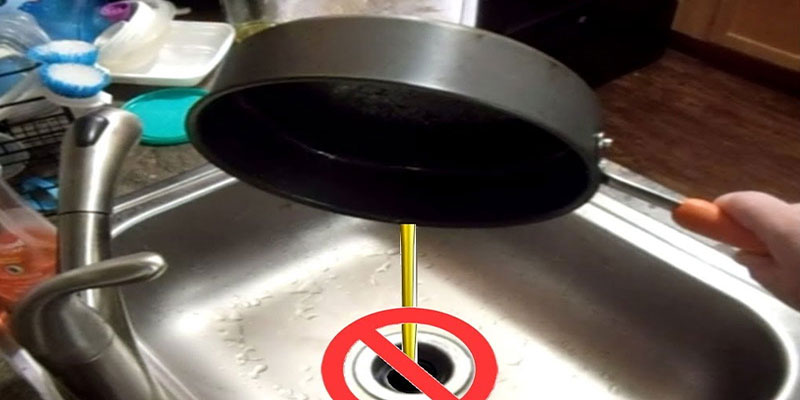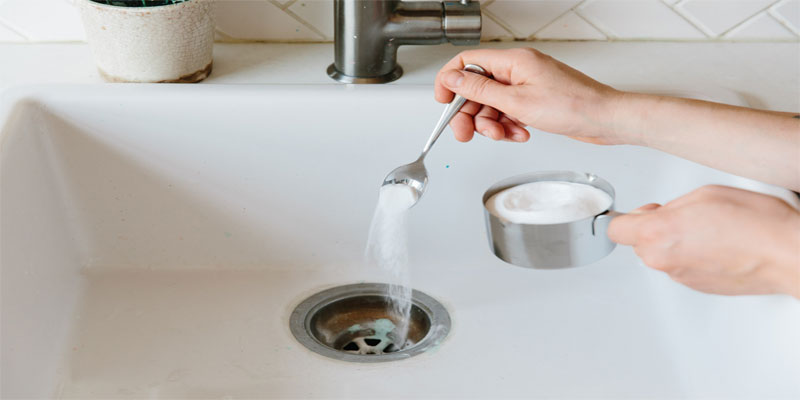Why You Should never Drain Oil Down Your Kitchen Sink?

Spilling oil down the sink can cause a number of plumbing issues.
Before you begin to pour that cooking oil down the kitchen sink - STOP! Yet it seems super comfortable to just pour the oily material down the sink drain, you'll have created a major plumbing mistake.
Why? Oil thickens once it cools down and can cause a bunch of plumbing problems. Therefore, if you can't drain it down the kitchen sink, what are you supposed to do with unwanted oil?
Why oil is bad for the kitchen sink drain and plumbing?
As stated before, oil poured down the kitchen sink pipe can create several serious and costly - plumbing problems. The oil you empty down the kitchen sink may be liquid as spills out of the pan, however, it does not stay that way for long. Within a few minutes, the oil cools down and thickens in your drain pipes. This thick mass acts as a trap for different debris draining down the pipes and can create a heavy blockage. Eventually, you may notice the kitchen sink draining gradually or not at all due to completely clogged drain pipes.
If oil should not be drained down the kitchen drain, then you might be questioning: Can you spill oil down the toilet too? Once again, the answer is no. Oil drained down the toilet will still thicken and clog up sewer pipes. The result can be costly sewer repairs for your home.
Oops! I previously drained oil down the sink drain, what now?
In case you're already poured oil down the drain don't panic - there are several preventative actions you can take so you can decrease the risk of damage to your pipes.
First, let your faucet with hot water run. While you do so, empty a gallon of boiling water gradually down the drain. Squirt dish soap inside the kitchen sink drain pipe as the hot water pours down. Any hardened oil should be liquified by the boiling water and the dish soap should help the oil and any debris leave your drain pipes.
Preventative steps to avoid kitchen sink clogs.
Preventative maintenance is the most suitable form of preservation. Besides oil, there are lots of other causes of drain clogs, such as soap residue and coffee grounds. To prevent kitchen sink clogs, avoid spilling oil down the sink and place of used coffee grounds and additional debris in the garbage.
To avoid other food and other trash from slipping down the kitchen drain and possibly creating a clog, place a drain screen. A drain screen will additionally stop soap residue from sliding down the pipes. Both options can be purchased at a nearby hardware store.
How to dispose of cooking oil and grease?
If you can't spill oil in the toilet or kitchen sink drain, then where can you? The answer is to use the trash can. Spilling hot oil right into your trash can is not ideal, so follow these steps to get rid of it correctly:
1. Allow the oil to cool down and thicken.
2. Once the oil is hard, scrape it off into a container.
3. Once the container is full, throw it away into the trash can. It's recommended to place the full container in a plastic bag to prevent leaks.
4. After you've got rid of the oil, wash your bowls, pans, or whatever you used to cook with before rinsing them off in the sink. Though there would not be so much oil leftover, even a small amount of oil can build up in your drain pipe over time.

How to unclog a kitchen sink impacted with oil?
In case your kitchen sink drain is clogged due to oil, there are different solutions you can try besides the soap with hot water method suggested above. apply some baking soda and hot water down your kitchen drain. Baking soda is a strong cleaning agent and absorbs unpleasant odors. Another way is to pour one cup of vinegar into the drain and let it rest for about 30 min. Then, pour boiling water in it. This blend helps remove organic material obstructing your pipes.
However, some clogs will require more than just home treatments to be made. You may need to call a handyman plumber (305) 676-7969 to inspect your pipes and unclog your kitchen sink with the appropriate tools.





